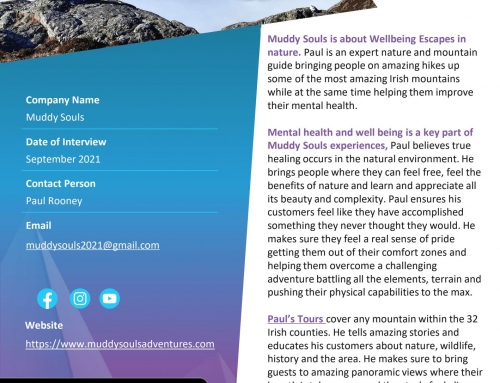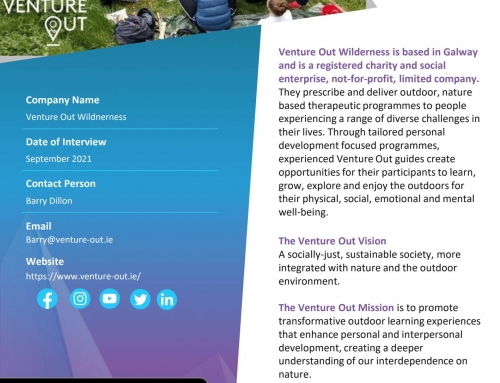The next 10 years are critical for Ireland to address the climate crisis. As part of the European Green Deal, The Climate Action and Low Carbon Development (Amendment) Act 2021 commits Ireland to a 51% reduction in our overall greenhouse gas emissions by 2030. No later than 2050 Ireland needs to be climate resilient, biodiversity rich, environmentally sustainable and climate neutral economy.
For the enterprise sector to build its resilience in the transition to a low carbon economy, businesses will need to develop management capacity and skills to assess the likely changes to their cost base, regulatory environment, market standards and customer preferences.
There is a particular challenge in delivering climate action and carbon reduction measures in rural Ireland given the dispersed nature of the population. The Department is working with stakeholders to drive the preparation of small-scale climate-friendly and sustainability measures as part of capital regeneration, rural development, and PEAK initiatives.
Sustainability and alignment with the UN SDGs in areas such as climate action, clean energy, sustainable communities, economic growth, innovation, and infrastructure, as well as education and health are paramount to PEAK potential. Measures include Carbon Taxing, COVID Green Recovery Plan, Energy Efficiency, Sustainable Mobility (travelling by cleaner and greener transport shifting away from private cars to electrical transport and active travel (walking, cycling etc.), enhanced Biodiversity and Resilient Supply of Food and Circular Economy.
The Department intends to pivot its investment programs in cultural and sporting infrastructure, and support the objectives of the Clim ate Action Plan including decarbonization and retrofitting initiatives.
The Climate Action Fund (CAF) was established to provide support for projects, initiatives and research that contribute to the achievement of Ireland’s climate and energy targets. The CAF will provide at least €500 million in government funding up to 2027 towards this aim. This will ensure that substantial funding is available to support relevant climate projects.
To assist the Department of Environment, Climate and Communications to fund its obligations under the Climate Action Plan, to deliver the National Broadband Plan and in allocating the additional €5 billion from 10 years of Carbon Tax receipts, it will receive a total indicative allocation of €12.9 billion over the 2021-2030 period. People will be equipped with the right skills to be able to participate in and benefit from the future net-zero economy.
Completion of the National Smart Energy Metering program commenced in 2019, with 2.25 million meters to be installed by the end of 2024
Heritage and tourism challenges are those stemming from land-use change, climate change and biodiversity loss, dereliction and a lack of awareness of the value of heritage and tourism. Keeping national tourism products intact, enhanced, developed, and promoted will help secure the long-term viability of sustainable tourism incomes and will need to be a priority going forward.
Policy Measures and significant investment.
- It will be used to manage the balance between nature conservation, biodiversity, and visitor amenities
- In visitor facilities, with a strong emphasis on conservation and protection of biodiversity
- Investment and delivery of new walking and cycling trails, outdoor recreational facilities, interpretation, visitor improvements and the enhancement of the visitor experiences particularly in environmentally sustainable parks such as the Burren
- To support the National Biodiversity Action Plan 2017-2021, and the successor plan and invest in Agri-environment schemes. Section 3 Page 42 provides examples of how SMEs can benefit;

An Taisce Green Communities that has been supporting a network of some 30 community groups since 2008.
Businesses in the Community Ireland (BITCI) work with the private sector to increase awareness and understanding of the importance of embedding biodiversity into their decision-making. See the Biodiversity Handbook for Businesses. Establishment and delivery of courses at various NFQ levels accessible across the country. Sustainable Applied Ecology, Ecotourism with Environmental Studies, Environment, Sustainability and Climate.
Climate Action Plan 2021 for Enterprises (Page 98) Enterprise will play a pivotal role in reducing emissions by 51% by 2030. SMEs influence the way scarce resources are managed along supply chains, from raw materials to the consumption of final products and the disposal of waste. Businesses that take action to mitigate against the risks of climate change and those with environmental credential requirements can potentially benefit from increased access to environmentally conscious customers, markets and workers, green equity and loan funding, and support from local communities. Climate action presents opportunities for existing supply chains and new business formations. But it also creates the need to comply with enhanced regulations, as well as the demands of investors and customers for credible sustainability impact and reporting.
Supports for Environment and Climate Focused SMEs
- ie Climate Toolkit 4 Business and SME Climate Hub and The Results-Based Environment Agri Pilot Programme (REAP)
- SEAI Sustainable Energy Authority of Ireland (Business Grants and Supports, Support Scheme for Renewable Heat, Energy Academyand SEAI Energy Show, EXEED Certified Program (Excellence in Energy Efficiency Design (EXEED), Accelerated Capital Allowance (ACA) is a tax incentive scheme for energy-efficient equipment, Support Scheme for Renewable Heat)
- Enterprise Ireland The Enterprise Transition Green Fund (Climate Action voucher, GreenStart, GreenPlus grant)
- Skillnets Climate Ready Academy
- Microfinance Ireland Green Vehicle Loan
- Irish Water Water Conservation for Business Hub
- Waste Electrical and Electronic Equipment (WEEE) Recycling for Small Businesses
- Environmental Protection Agency grant-aid funding Green Enterprise: Innovation for a Circular Economy, ie, Tool for Resource Efficiency and Carbon Footprint Calculator, The National Waste Prevention Program, ‘green your business’.
- Local Authorities, Councils and Services
1. Gov.ie
Gov.ie online Climate Toolkit 4 Business and SME Climate Hub to assist all businesses, and small and microenterprises, in particular, to make a good start in understanding and adapting their activities to assist in climate mitigation. The kit includes a simple carbon calculator and will generate a tailored company climate action plan for each business
The Results-Based Environment Agri Pilot Program (REAP) pays farmers to maintain and improve the environmental conditions of their land. The program aims to improve existing farm features and habitats, rather than create new ones.
https://www.climatetoolkit4business.gov.ie/ie/

2. SEAI Sustainable Energy Authority of Ireland
SEAI continue to support energy audits, provide free training for businesses, and provide Business Grants and Supports to those who want to invest in energy efficiency, particularly SMEs.
Capital support schemes include the Excellence in Energy Efficiency Design and Support Scheme for Renewable Heat available to commercial and public sectors.
The e-learning service called Energy Academy advises businesses on how to meet energy efficiency goals. It shows them how energy efficiency practices can help reduce energy waste and lower your carbon footprint. It also upskills staff on energy efficiency. SMEs will understand their energy use, create an energy action plan, complete an energy audit, learn how to track and report etc.
SEAI Energy Show is where SEAI hosts free workshops, expert briefings, and best practice demonstrations. Businesses can learn how to save energy and costs, as well as new energy market developments.
https://smeclimatehub.org/tools/
EXEED Certified Program (Excellence in Energy Efficiency Design (EXEED) is an incentive program to promote energy efficiency in business. Successful applicants can get grant support of up to €1,000,000 per project. It can help SMEs fund the energy-efficient design of heating, cooling, refrigeration, compressed air and business processes. Examples include:
- Improving insulation
- Installing air handling units with heat recovery
- Installing electric vehicle chargers
- Installing energy-efficient heating and cooling equipment
Accelerated Capital Allowance (ACA) is a tax incentive scheme. It allows a sole trader, farmer or company that pays corporation tax in Ireland to deduct the full cost of energy-efficient equipment from their profits in the year of purchase.
Support Scheme for Renewable Heat can help your business adopt renewable heating systems by providing a grant. The scheme is open to commercial, industrial, agricultural, district heating, public sector and other non-domestic heat users.
Rethink Ireland’s Green Transition Fund’s aim is to drive decarbonization and enterprise resilience in the transition to a low carbon economy.

3. Enterprise Ireland
The Climate Enterprise Action Fund is targeted at both foreign and indigenous enterprises to assist them in achieving carbon abatement and thereby building their resilience, competitiveness, and environmental sustainability. It provides a range of financial supports to assist SMEs in going green.
The Climate Action voucher to the value of €1,800 to cover either technical or advisory services relating to the operations of the business. The aim is to help you plan for a low-carbon, resource-efficient economy.
GreenStart grant of up to €5,000 to help cover the costs of hiring a ‘green consultant’ or trainer. The consultant will introduce environmental best practice systems and structures, cost reduction targets and a foundation for future environmental improvement projects.
GreenPlus grant to fund up to 50% of your climate change and sustainability plan. SMEs can also use the grant to partially cover the salaries of up to 10 ‘green project’ team members.

4. Skillnets
The Climate Ready Academy offers specialized training for businesses in climate action, sustainability, corporate social responsibility. Businesses can also develop sustainability awareness and learn about best practices using the Climate Ready online learning platform. SMEs can register for a free 12-week online workshop about reducing energy waste, delivering cost savings, and protecting the environment. For more about sustainability practices in the workplace, visit the Climate Ready Insights website by Skillnet Ireland.
Skillnets Supporting Irish Businesses to become Climate Ready. Offers leadership and skills support for enterprises that want to develop their operational and strategic sustainability.https://www.skillnetireland.ie/climate-ready/

5. Microfinance Ireland
Green Vehicle Loan (‘eSPSV Business Loan’) If you own a Small Public Service Vehicle (SPSV), such as a taxi, hackney, or limousine, you may be eligible for the Green Vehicle Loan (also called ‘eSPSV business loan’). Successful applicants will get a loan between €5,000 and €25,000, to help replace their vehicle with an electric or hybrid model.
6. Irish Water
Water Conservation for Business Hub created by Irish Water is an online information hub to help businesses conserve water. This includes videos, fact sheets and ‘how-to’ guides to help your business reduce water waste. It also includes practical advice for specific sectors e.g., hospitality, agriculture and manufacturing.
7. Waste Electrical and Electronic Equipment (WEEE) Recycling for Small Businesses
Waste Electrical and Electronic Equipment (WEEE) Recycling for Small Businesses RecycleIT have a complete list of locations where waste can be dropped off for disposal.
8. Environmental Protection Agency (EPA)
The Government’s Waste Action Plan for a Circular Economy provides a clear roadmap to support continued private sector investment in waste treatment infrastructure, including anaerobic digestion, recycling, and recovery infrastructure that will be needed to ensure Ireland continues to meet our EU targets. The Environmental Protection Agency has an annual grant-aid funding call, named Green Enterprise: Innovation for a Circular Economy. The initiative supports businesses to develop and demonstrate innovative practical applications and solutions that prevent waste and stimulate the circular economy. The maximum amount of funding available is €100,000 per grant award. The fund is open to projects linked to food, resources, furniture, textiles, plastics etc
A circular economy is where no resources are wasted and the value of materials are kept in the economy as long as possible, through reuse, repair, and recycling. (europarl)
‘Meeting climate targets will require a transition to a more circular economy, which protects and restores our environment through sustainable resource use’ (epa.ie)
GreenBusiness.ie has developed the Environmental Protection Agency EPA Tool for Resource Efficiency simply do a quick overview of your company’s resource efficiency relating to water, waste and energy. Get an Action Plan for Resource Efficiency.
Carbon Footprint Calculator helps you reduce your company’s carbon footprint by first finding out its current carbon emissions. This is free for small businesses taking into account, heat and energy consumption, the volume of waste and how its disposed, product packaging, using local suppliers, refrigeration etc…
The National Waste Prevention Programme has developed resources to help ‘green your business. It includes factsheets and case studies specific to the hospitality sector, and others.
The EPA also has articles about ‘greening your office’ and resource efficiency in the retail sector on the EPA website.
9. Local Authorities, Councils and Services
Recycling business waste County Councils and Local Authorities provide advice and Waste Management Guides for businesses Midlands Wise Waste Business Guide, Sustainability Ideas for SMEs Fingal, Limerick and Clare Waste Prevention Guide for Businesses. Employee recycling in the workplace downloading posters and ordering bin labels and checklists from MyWaste.ie. Before you dispose of waste, check if it can be repaired. You can find local repair professionals on repairmystuff.ie.




